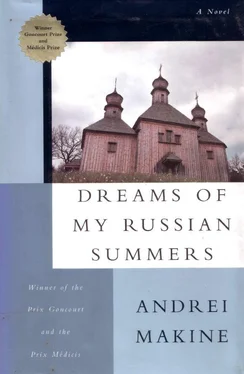She died two years later. It was an August evening, calm and transparent. Charlotte was returning from the library, where she had been employed to sort through the mountains of books collected from demolished aristocratic homes… Her mother was seated on a little bench fixed to the wall of the izba , her head leaning against the smooth wood of the logs. Her eyes were closed. She must have dozed off and died in her sleep. A light breeze coming from the taiga stirred the pages of the book open on her knees. It was the same little French volume with gilt edges.
They were married in the spring of the following year. He came from a village on the White Sea coast, ten thousand leagues from this Siberian town the civil war had brought him to. Charlotte noticed very quickly that his pride in being a "people's judge" was mingled with a vague unease, whose origin he himself could not have explained at the time. At the wedding supper one of the guests proposed that the death of Lenin be commemorated by one minute's silence. Everyone stood up… Three months after the marriage he was posted to the other end of the empire, to Bukhara. Charlotte was absolutely set on taking the great suitcase filled with old French newspapers. Her husband had nothing against this, but on the train, ill concealing his obstinate unease, he gave her to understand that a frontier more impenetrable than any known mountain range you cared to mention would arise now between her French life and their life. He tried to find the words to express what would soon seem so natural: the iron curtain.
CAMELS in a snowstorm; frosts that froze the sap in the trees and caused their trunks to burst; Charlotte's numb hands catching huge logs thrown down from the top of a railway truck…
It was thus in our smoke-filled kitchen, during the long winter evenings, that this legendary past was reborn. Outside the snow-covered window there stretched one of the greatest cities in Russia as well as the gray plain of the Volga; out there arose the fortress-buildings of Stalinist architecture. And inside, amid the chaos of an interminable meal and the iridescent tobacco clouds, the shade of this mysterious Frenchwoman, lost beneath the Siberian sky, made its appearance. The television was pouring out the news of the day, transmitting the sessions of the latest Party congress, but this background noise did not make the slightest impact on the conversations of our guests.
Squatting in a corner of this crowded kitchen, with my shoulder against the shelves on which the television was enthroned, I listened to them avidly while trying to make myself invisible. I knew that soon the face of an adult would loom up through the blue fog, and I should hear a cry of simulated indignation: "Hey, just look at him, the little sleepwalker! It's past midnight and he's still not in bed. Go on, off you go! Stir your stumps! We'll send for you when you've grown a beard…"
Banished from the kitchen, I found it hard to get to sleep right away, fascinated by the question that kept returning to my young mind: "Why are they so keen on talking about Charlotte?"
At first I thought I understood why this Frenchwoman was an ideal topic of conversation for my parents and their guests. For it only took memories of the last war to be mentioned for an argument to break out. My father, who had spent four years at the front in the infantry, attributed the victory to those troops mired in the earth who, in his phrase, had irrigated this earth with their blood, from Stalingrad to Berlin. His brother, without wishing to upset him, would then observe that, "as everyone knows," the artillery was the ruling goddess of modern war. The debate would become heated. Little by little the artillerymen would find themselves being labeled "funks," and the infantry, on account of the mud on the roads in war, became the "infectionary" It would be at this moment that their best friend, an ex-fighter pilot, would intervene with his own arguments, and the conversation would plunge into an extremely perilous nosedive. And that was before they went into the respective merits of the fronts they had been on, all three different; let alone the role of Stalin during the war…
This arguing, I sensed, pained them greatly. For they knew that, whatever their own part in the victory had been, the die was cast: their own generation, decimated, massacred, would soon disappear, along with the foot soldier, the gunner, and the pilot. And my mother would precede even them, in accordance with the fate of children born at the beginning of the twenties. At fifteen I would be left alone with my sister. It was as if in their arguments there was an unspoken foreknowledge of this immediate future… Charlotte's life, I believed, reconciled them, offering a neutral territory.
But as I grew older I began to detect quite a different reason for this French predilection in their interminable discussions. It was that Charlotte's advent under the Russian sky was like that of an extraterrestrial being. The cruel history of this immense empire, of its famines, its revolutions, its civil war, was nothing to do with her… We Russians had no choice. But she? Through her eyes they could observe a country they did not recognize, because judged by a foreigner, sometimes naive, often more perspicacious than themselves. Charlotte's eyes reflected a disturbing world where unforced truth abounded – an unfamiliar Russia that they needed to discover.
* * *
I listened to them, and I too discovered Charlotte's Russian destiny, but in my own way. Certain details, hardly mentioned, became magnified in my mind and created a whole secret universe. Other events, to which the adults attached considerable importance, passed unnoticed.
Thus, strangely, the horrible images of cannibalism in the villages of the Volga affected me very little. I had just read Robinson Crusoe, and Man Friday's fellow countrymen with their joyful rites of anthropophagy had inoculated me, through fiction, against real atrocities.
And the feature of Charlotte's rural past that made the greatest impression on me was not the hard labor at the farm. What I remembered above all was her visit to the young people of the village. She had gone to see them that very evening and had found them engaged in a metaphysical discussion: the topic was what kind of death would befall someone who dared to go to the cemetery on the dot of midnight. Charlotte had smiled and said she was capable of confronting all supernatural powers among the tombs that night. Distractions were few and far between. The young people, secretly hoping for some macabre outcome, had saluted her courage with tumultuous enthusiasm. They only needed to find an object that this harebrained Frenchwoman could leave on one of the tombs in the village cemetery. And it was not easy. For everything that had been proposed could be replaced by a duplicate: scarf, stone, coin… Yes, the wily foreigner could very well go there at dawn and hang up this shawl while everyone else slept. No, a unique object had to be chosen… Next morning what an entire delegation had found, hanging from a cross in the shadiest corner of the cemetery, was "the little Pont-Neuf bag."
It was in picturing this woman's handbag amid the crosses, under the Siberian sky, that I began to have a feeling for the incredible destiny of things. They traveled; beneath their commonplace exterior they logged the different periods of our lives, linking moments that were very far apart.
As for the marriage of my grandmother to the people's judge, doubtless I did not notice all the historical piquancies that the adults could detect in this. Charlotte's love, my grandfather's courtship of her, the couple they made, so unusual in that Siberian country – of all that I grasped only a fragment. Fyodor, his tunic well pressed, his boots gleaming, makes his way toward the place for their crucial rendezvous. A few paces behind him his clerk, the young son of a priest, conscious of the gravity of the moment, walks slowly, carrying an enormous bunch of roses. A people's judge, even when in love, must not look like a mere operatic suitor. Charlotte sees them from afar, understands at once the scene that has been prepared, and with a mischievous smile accepts the bouquet that Fyodor takes from the hands of the clerk. The latter, intimidated but curious, backs away.
Читать дальше












